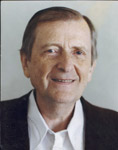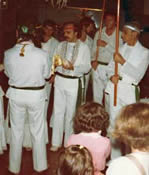English Interview to Stanley Krippner, |
||
Stanley Krippner, Ph.D.is one of the American foremost scholars in the field of parapsychology and consciousness studies.Stanley Krippner is a professor of psychology at Saybrook Institute in San Francisco, where he is also the director of the Center for Consciousness Studies. He is a Past President of the Association for Humanistic Psychology, and also Past President of the Parapsychological Association He is Honorary Member of CEO Centro de Estudios Oníricos de Chile. He is the author and co-editor of more than 24 books, a number of articles and papers posted on this WebSite See Articles on Line/ Articulos en Línea, Libros Recibidos (English)- and Estudios Científicos).His last book El Lenguaje de la Noche,(RILeditores) is a second Spanish edition of Dreamwork&Dreamtime co-edited with Rosa Anwandter in August 2006. |
 Dr. Stanley Krippner. |
|
Recent Awards:
The Ashley Montagu Peace Award (given on behalf of Common Bond Institute, Harmony Institute, the Association for Humanistic Psychology, and the Annual International Conference on Conflict Resolution), St. Petersburg, Russia, 2003.
The American Psychological Association Award for Distinguished Contributions to Professional Hypnosis, Division 30 (Psychological Hypnosis), 2002.
The American Psychological Association Award for Distinguished Contributions to the International Advancement of Psychology, 2002.
The Dr. J.B. Rhine Award for Life-Time Achievement in Parapsychology, Andhra University, Prof. K. Ramakrishna Rao Endowment, Visakhapatnam, India, 2002.
The Senior Contributor Award, Division 17 (Counseling Psychology), American Psychological Association, 2000.Award for Life Achievement.IASD International Association for the Study of Dreams.June 2006. Award for the Integration of Cultures .Centro de Estudios Oníricos de Chile.August 2006
Dr. Krippner:
You and Dr. Montague Ullman devoted some years of your life to an experimental approach on dream studies and telepathy at the Dream Laboratory of the MaimonidesMedicalCenter in New York. Since then, do you maintain the same theory?
When Dr. Ullman and I did our experiments, we both were of the opinion that we were tapping into a dimension that connected all humankind at very deep levels. Ullman had studied with David Bohm and had learned about the surface or "explicate" order of reality as contrasted with the underlying or "implicate" order of reality. Anomalous dreams seem to emerge from the "implicate" order. I took a similar opinion, based on my readings in general systems theory and, later in chaos and complexity theory. During the dreaming process, the brain is extremely sensitive to small variations in initial conditions (often called "the butterfly effect"). These variations include residual feelings from daytime experiences as well as memories, especially those concerning activities during which conflicts were left unresolved (in other words, "incomplete gestalts"). The sleeping brain engages in a process of self-organization where these subtle influences often combine with elements of a "universal unconscious" (Bohm's "implicit order"), especially if the dreamer's conscious or unconscious intention is at play. In other words, it is more likely that the dreamer will dream about a hidden art print if he or she "intends" to do so than if the purpose of the experiment is not explained before the dreamer goes to sleep.
Based on your research, who may have these sort of dreams?
Anyone may have anomalous dreams, just as anyone can play the piano. However, a genetic predisposition combined with encouragement in one's early years and proper technical training produces a concert pianist. In a similar way, a "psychic virtuoso" is the result of genetic predisposition, acceptance and/or encouragement of unusual abilities by family and/or community, and some sort of role-modeling, technical training, personal introspection, and/or social reinforcement. However, just bout anyone may have a spontaneous anomalous dream, even if it only occurs once or twice in their lifetime.
Why do you believe most scientists are not very enthusiastic about these phenomena?
Most contemporary scientists are not enthusiastic about anomalous phenomena for several reasons. In the first place, they seem to violate what mainstream science believes about the parameters of time, space, and energy. In the second place, parapsychologists have not been able to replicate their experiments frequently enough to satisfy criteria of contemporary scientific authorities (even though there are less controversial scientific phenomena with a low replication rate that, nonetheless, have been accepted). Third, parapsychologists rarely have built upon the past research. There are very few ongoing programs of activity; parapsychologists tend to "reinvent the wheel" every time they obtain some research money. Then they run out of funds and promising lines of research come to a halt. Later, someone else may pick up that line of research but will go back to the beginning instead of continuing where the previous researcher left off. I do not think that the first objection is a legitimate challenge to parapsychology, but I do believe that the latter two objections need to be taken seriously and addressed.
Which is the difference between knowing the meaning of a dream and ignoring it?
Dream appear to serve a function whether they are remembered or not. That function is not completely understood, but it seems to be related to the consolidation of memories, the "weeding out" of useless daytime material, the "storing" of important daytime experiences, and the working through conflicts and problem topics that have not been resolved during wakefulness. All of this can be done without dreamers remembering their dreams, although dream recall can bring waking attention to the process. An old Hebrew aphorism states, "A dream not remembered is like a letter not opened." I think that is an overstatement. In the first place, one can read a letter but not understand it. In the second place, an unopened letter still serves a purpose to the person who wrote it; perhaps a more important purpose than it does to the person receiving it. Nonetheless, if people recall dreams, work with them, and reach some degree of understanding, they may change their attitudes and behavior. This becomes a self-correcting process. If the new attitude or behavior is functional, practical, and workable, one would assume the dream was correctly interpreted. If not, the dreamer should review his or her interpretive procedures to see if they could be improved. Perhaps one has relied on a "dream dictionary" that states unequivocally how the dream should be interpreted. This is not the most reliable way of working with dreams because it assumes that there is one meaning for each dream image. Instead, dream symbols and metaphors are highly specific to a person and to a culture.
How dreams can help people to became aware of their inner potentialities?
Dreams can help people become aware of their inner potentialities in several ways. If correctly recorded and wisely interpreted, they can be used to solve creative problems. They can indicate when a course of action needs to be changed. If repetitive, they can illustrate an area of one's life that is incomplete (for example, the dreamer needs to forgive someone, or the dreamer needs healing, or the dreamer needs to change a potentially disastrous activity). They can even serve spiritual functions such as providing contact with the teachers of such spiritual teachers as Jesus, Mary, Buddha, Mohammed, Krishna, Lao-tsu, as well as shamans, saints, and spirits. But, as the Bible says, "By your fruits, you shall know them." If a spiritual guide encourages murder, theft, manipulation, or sexual seduction, I would doubt the authenticity of the message.
What do you think about shaman's rituals to get into trance?
Shaman's enter altered states of consciousness in order to obtain information that will assist members of their community. Often, they feel that they can not obtain this information (about healing, providing useful advice, predicting the weather, finding food and other resources) if they simply rely on their waking thoughts and reasoning. Dreams are commonly used by shamans, as well as altered states entered into by drumming, dancing, fasting, and isolating themselves so that their imagination can move freely among the so-called "upper world" and "lower world," as well as the past and the future. Shamanism has served indigenous people fairly well for tens of thousands of years; it is likely that there are elements of its technologies that are effective and practical.
Which is the benefit of understanding the meaning of a dream under hypnosis?
Some people use hypnosis (including self-hypnosis) to help them understand the meaning of a dream. Hypnosis can provide access to one's imagination, and provide insights that are lacking while the dreamer is working on the dream logically and rationally. There is nothing wrong with working with a dream this way; but sometimes a dreamer also needs access to fantasy, "free association," and the powers of imagination. Hypnosis, if correctly applied, can provide this access. However, some forms of relaxation and meditation can also be effective means of providing useful associations to dream images
Which is your opinion about dream groups?
Dream groups are becoming increasing popular in the United States, with or without a psychotherapist directly them. If they are carried out in a spirit of cooperation and in a non-authoritarian atmosphere, they can be extremely helpful. Dreamers can obtain perspectives on their dreams that they would not have come up with themselves. The fact that dream groups are regularly scheduled provides an impetus for people to remember their dreams.
How do you foresee the future on dream work in our western world?
The future of dreamwork in the Western world may help people focus more on their inner lives, on spiritual matters, on understanding their deep intentions, and on developing their creativity. As a result it may distract them from the self-centered, materialistic emphasis on accumulating material goods and social prestige that have been hallmarks of the modern era. Dream-sharing appears to have played a part in the development of many societies, promoting social cohesion. The torn cultures of the Western world are in dire need of forces that promote harmony rather than discord, and the renewed interest in dreams may be one force to promote this change.
 |
Urban Shamanic Ceremony in Brazil. |
|
© Copyright.CEO. 2004 |